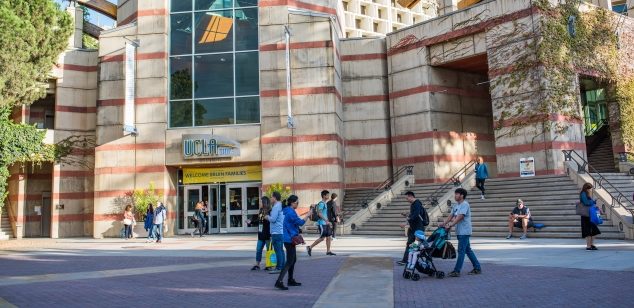Opinion
Education: One student’s triumphant odyssey
 Then student bookstore on the campus of UCLA, October 2017. (Photo: Michael Gordon)
Then student bookstore on the campus of UCLA, October 2017. (Photo: Michael Gordon)My childhood dream was to be a teacher. But because of my dyslexia and difficulty with math, I thought the only jobs I’d ever be qualified for were jobs that don’t require a college degree. It wasn’t until the recession hit and I lost my job waiting tables that I decided try community college.
At 25, I enrolled at American River College. To my surprise, I found that I excelled in all my classes, especially public speaking — I had so much to say, and was eager to refine my writing and presentation skills.
American River was one of a small number of colleges in the state to offer Statway, a two-semester program that allowed me to enroll directly into College Statistics.
But I put off taking any math. I probably faced a year or more of remedial courses before I could enroll in College Statistics, the math required for my Communications degree.
At the time I didn’t know the statistics about students of color and math remediation – that we’re more likely to be classified as “unprepared” for college and are often required to take three or more remedial math courses before we can start earning credit in college-level math. I didn’t know that fewer than 1 in 10 students who are placed into these low classes will complete the math requirements for a bachelor’s degree.
I didn’t know the data, but I knew I felt hopeless.
Fortunately, American River was one of a small number of colleges in the state to offer Statway, a two-semester program that allowed me to enroll directly into College Statistics. The program is designed for humanities and social science majors as a way for students to meet college-level quantitative reasoning requirements without getting stuck in remedial classes.
I signed up for Statway looking for the quickest way to get through my math requirements, but it ended up being exactly what I needed, both educationally and personally, at this time in my life.
My teacher, Professor Brock, was inspiring. She was kind and insistent that we would understand the material. It was never a question of if we would understand a lesson. She was certain that with time, we would understand it. She explained that learning was like a muscle that you need to exercise – with practice, you will improve.
The curriculum used real world examples of applied statistics, and I’ve drawn upon what I learned there in my future classes. I’m now a graduate student at Sacramento State, conducting research into the correlation between how much people talk and how engaged they are, and I’m confidently analyzing this data based on my experience in Statway.
Most important, I fell in love with learning and recovered my childhood dream of becoming a teacher. After completing my master’s program, I plan to get my PhD and become a professor.
I don’t understand why programs like Statway aren’t offered throughout California. Why would colleges want to force students to take one to two years of remedial courses, when people like me are proving that we can be successful by starting right out in College Statistics?
The good news is that this may be changing, with new policies at CSU and the recently signed AB 705 legislation governing community college remediation.
In the next few years, I hope that all students will have access to the kind of experience I had — with math that is relevant to what they are studying, in classrooms where they feel comfortable and empowered, taught by faculty who help them fall in love with the material and inspire them to dream about their future.
As a future college professor, that’s the kind of class I hope to lead.
—
Ed’s Note: Cesar Bernardo Torres is a graduate student in communications at California State University – Sacramento, where he recently earned his bachelor’s degree. He is also a former student of American River College in Sacramento.
Want to see more stories like this? Sign up for The Roundup, the free daily newsletter about California politics from the editors of Capitol Weekly. Stay up to date on the news you need to know.
Sign up below, then look for a confirmation email in your inbox.

Leave a Reply